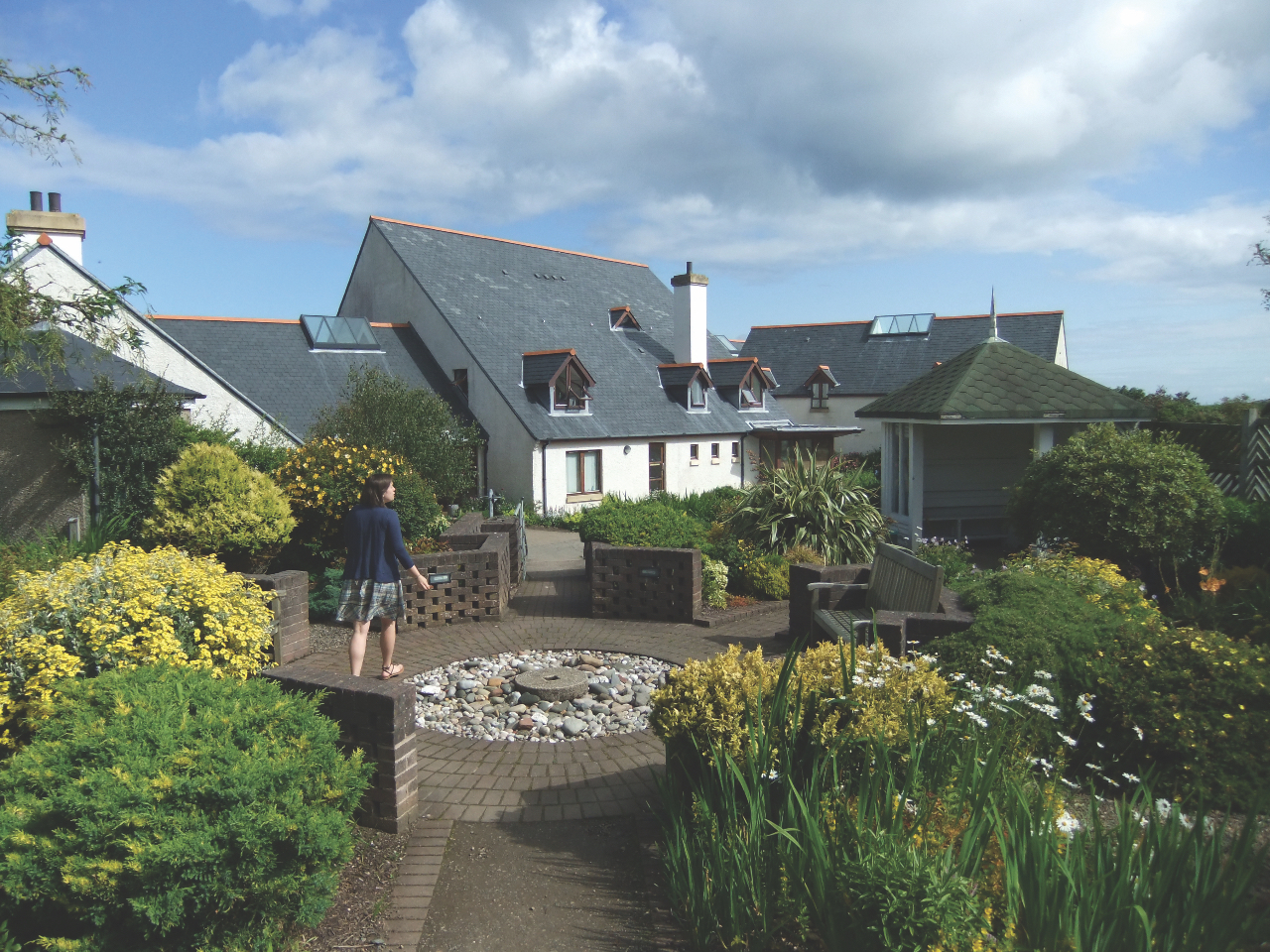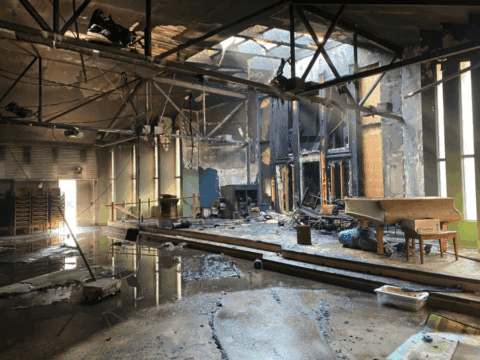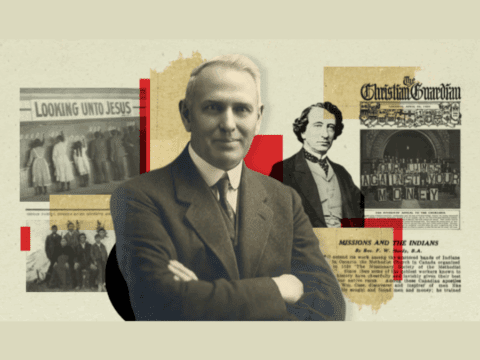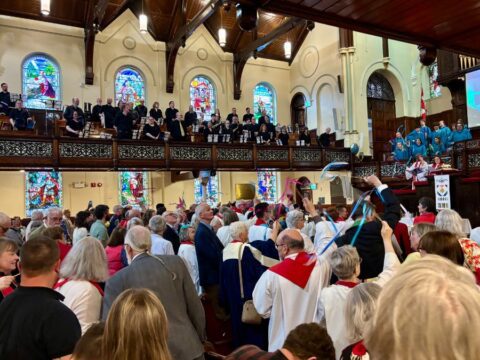I stepped off the bus, my third of the day, a few feet from the beach at Ballycastle, Northern Ireland, at about 5 p.m. I had been travelling for just over 24 hours, and although I was dead tired, the view of the sea reinvigorated me. “That’s where you want to go,” the bus driver said, pointing to a little white dot high up on a hill in the distance — Corrymeela, a centre for peace and reconciliation, and my home for the next three months.
As the bus drove off, I continued to take in the breathtaking view. Moments later, a little car drove up and there was Aileen, the centre’s volunteer co-ordinator, whom I knew only through many e-mails and one Skype conversation. We proceeded along the beach road and up the huge hill to the community of Corrymeela. The other volunteers warmly greeted me as Aileen showed me to my room in the volunteer house. A carefully crafted card on the door read “Martha.”
“Have a little rest,” Aileen said, “and if you are up to it, the summer volunteers arrive at 6:30, and then we’ll all have dinner together.” And so began my Corrymeela adventure.
Corrymeela was founded in 1965 by Rev. Ray Davey, who was then the Presbyterian chaplain at Queen’s University in Belfast. At the centre’s launch, Davey described his vision for the ecumenical community: “We hope that Corrymeela will come to be known as ‘the Open Village,’ open to all people of goodwill who are willing to meet each other, to learn from each other and work together for the good of all.”
Today, over 7,000 people visit the centre annually. Corrymeela also invites over 400 volunteers a year to spend time working in the community for a weekend, several weeks, months or even years. This past summer, from late June until mid-September, I had the privilege of being one of those volunteers.
What drew me to Corrymeela? I was looking for an intentional Christian community that welcomed guests for an extended time and integrated them into the daily life of the group. I was also aware that after nearly 25 years of working with children and youth in educational ministry, I needed some new ideas.
I had heard about Corrymeela in 2006 while working at the Tatamagouche Centre, a United Church education and retreat facility in Nova Scotia. Colleagues spoke highly of the community’s peace-building initiatives with young people in Northern Ireland, and I wanted to know more. Were there skills and approaches that would enrich my own ministry practice?
Prior to my departure, I was prepped well by Aileen in our Skype interview. I would be expected to take part in all aspects of the community. That would mean helping in the kitchen, in housekeeping, in administrative tasks and wherever else my skills might be needed. I would be supporting the work of the long-term volunteers (LTVs), nine young adults from all over the world.
These young adults come at the first of September and stay for a year, providing the main leadership to the programs at the centre. I would be living in the volunteer house, mostly with the LTVs, the handful of other three-month volunteers and the many summer volunteers who cycle through every three weeks.
At some level, to walk away from my life, my family, my friends and my work felt foolish. It was also frightening to leave my ailing mother for so long. At every practical level, it made no sense. However, I could not discount the feeling I had deep in my heart that the hand of God was firmly leading me into the community.
I will confess to being totally discombobulated for the first few weeks. The nature of Corrymeela is one of constant change. There is always someone leaving and someone arriving, whether a group of participants, a volunteer or a community member. I observed the deep friendships among those who had been here for some time, and the grief when one of their members left. I wondered if I would ever find my place in the community.
In a candid talk, I shared this worry with Paul, the centre’s director. He said to me, “We need your fresh eyes,” meaning that newcomers help to bring fresh perspectives to the community, and these perspectives are listened to and honoured. The conversation was one of the many serendipitous moments I had at Corrymeela, when just the right person would come along at just the right time.
As a mantra during my stay, I often went back to the first journal entry I wrote as I was anxiously waiting for my plane to Dublin: “I am convinced God is leading me into this adventure. . . . My task will be to be present to each moment with awe and gratitude, and to remember everyone that has encouraged me to do this.”
Did I accomplish this? I would say mostly yes, sometimes no. Living in a house with sometimes up to 30 people, mostly young adults, had its frustrations. Sometimes those of us up first in the morning were faced with a large mess of dishes and clutter from the night before. Sometimes laundry was a challenge. With two washers and dryers for 30 people, it was best to figure out when most people had a day off and try to avoid the laundry room that day.
Still, I tried to live with a spirit of generosity toward my many roommates. As one volunteer said in her address to a new crop of summer volunteers, “Peace and reconciliation begins in this house, looking after and respecting each other.” All of us were challenged to put aside our own personal issues to be part of a collective, organic group working toward the same goal of providing hospitality and a safe space to everyone who visited the community.
By the end of my time at Corrymeela, I had lived with 101 people in the volunteer house. That’s a lot of coming and going, a lot of hellos and goodbyes. It was also a lot of deep conversations, hysterical laughter, shared meals and common tasks. I met people from just down the road in Ballycastle, from many different parts of Northern Ireland and the United Kingdom, from the Republic of Ireland, from all over Europe, and from Africa, the Philippines, the United States and Canada.
Some of those people I know I will never see again. But I carry those conversations and memories with me. One Sunday evening in late July, when folks were celebrating the end of a long and busy week, I was overwhelmed with homesickness, missing my own family Sunday dinners. Irene, a theology student from Boston, said, “But we’re your family now.”
My Corrymeela family ended up coming through for me in a deep way. On Aug. 12, midway through my stay, my mother died in Canada. One blessing was that it happened during the week my daughter Alana was visiting me. We were in Dublin and had just toured the 5,000-year-old passage tomb of Newgrange when we received the call from my sister.
The news was expected, because my mother had taken a bad turn during the week, but it was one of many bad turns in the past few years after which she had rallied, and I hoped that would be the case again. However, it wasn’t; my sister and I had agreed that should this happen, I would stay on at Corrymeela and we would wait until the early fall to have a memorial service.
I know in my heart that it was the right decision not to come home after my mother’s death, but it made the second half of my experience very different from the first. I was vulnerable, cried a lot, and depended on volunteers and staff to pick me up when I fell and comfort me even when I wasn’t sure what I needed. And they all surrounded me with love and support.
During my time at Corrymeela, I was pretty obsessed with the question, “Am I doing enough? Am I giving enough back?”
Surprisingly, a large part of my volunteer time was devoted to organizing worship. The couple originally assigned to this role had to leave the community unexpectedly in late June, and so I found myself coordinating and occasionally leading the two daily worship times, preparing a resource to support worship for all ages, and planning and leading special services, such as one commemorating the 10th anniversary of 9/11.
In my exit interview with Aileen, she said it was a great gift to the community for me to hold up the worship component during my stay. “You were the right person at the right time,” she told me.
And then it was my turn to say goodbye. It is the custom at Corrymeela that as soon as folks bid their farewells in the car park, those left behind run like mad to the top of the cliff so they can wave goodbye as the departing vehicle drives slowly down the steep hill. Not every volunteer gets the “Corrymeela wave” because it depends on the time of day you leave, how many people are around and how busy they are.
In my case, Paul, the director, was driving me to Belfast. After all the hugs, when I got in the car (still trying to get into the driver’s side!), I saw everyone start to run. “Oh my gosh,” I said. “I’m going to get the wave!” Paul drove slowly enough that I could take a picture, which I treasure, even though sometimes I wonder why they look so happy to see me go. But I know from having done the wave myself many times that it’s a blessing for the journey.
There’s a sign that greets you when you first enter the lobby of Corrymeela’s main building: “Corrymeela begins when you leave.” It’s a funny thing to see as one starts a journey. On my first day there, I could intellectually understand it, but since my return to Canada, I think I am slowly beginning to understand it in my heart.
For the gift of worshipping twice a day with a community for three months, for the sheep on the hill outside my bedroom window, for the daily walks along the beach to Ballycastle or toward the cliffs of Fairhead, for the constantly changing community that is Corrymeela, I feel gratitude and joy for the totality of my experience there. It was difficult, even painful at times as I grieved for my mother, but also filled with Spirit.
Yes, Corrymeela begins when you leave. What an astonishing statement that is — especially when you think of the thousands of volunteers over the centre’s 47 years, who, like me, take their experiences at Corrymeela back into the fabric of their lives all around the world. The hard work of peacemaking and reconciliation continues, but I know I’m in wonderful company.
***
This story first appeared in The United Church Observer’s March 2012 issue with the title “’We’re your family now.’”















